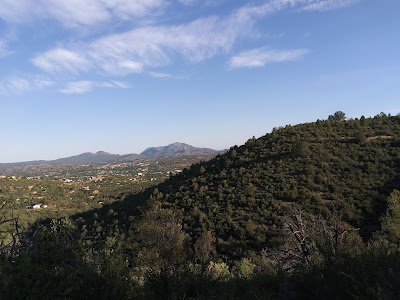the other day, this lengthy stretch of fencing (branded nicely enough with so much black, white, and red to represent the construction company Sundt, whose slogan seems to be three standalone words, "Skill. Grit. Purpose.") went up all along the drive that goes between my academic office building and various parking lots between here and places off-campus.
I'm told that they'll be building a new dormitory somewhere on top of the rocky, scrub-filled gully on the other side. it'll have more student housing and more classroom space. so cool. so necessary.
some of us in my academic office building are mildly worried that this new construction will block our most excellent west-facing views of Granite Mountain. we shall see, I guess. I remain hopeful that the slope of this gully will mean the top of the new dorm will be low enough for us to look over from our third floor offices.
as I walked back out from my office to my car last Tuesday, I noticed a little grey-brown bunny frantically searching for a way through the fence, up and down the hill in short bursts, back and forth over the blaring red curb, every so often sprinting for its life all the way across the road back to the unfenced rocks and bushes to the east.
I watched it for a solid few minutes. it hopped away in panic from my slowed footsteps, then dashed in further panic across the path of someone's big white SUV driving up past us both.
I didn't see the bunny come back that evening. so I studied the fencing as I walked. surely one little bunny would eventually find a gap to squeeze under, I thought. (the creatures seem to squeeze through pretty tiny gaps in our back garden gate, after all.)
if the chainlink were bare of this black branded tarp, then could a little bunny more easily get through? or if the corners of each fence panel were less square and more rounded, that would surely help.
I wonder if any of the planners and facilities and maintenance people worried about the impact of this construction project would have on the non-human critters in the area. hopefully at least a little bit. probably not as much as they worried about other aspects though-- the costs of labor and fencing and other materials; the design and the blueprints and the building's whole physical footprint; and the timing and logistics and how soon they can start selling spots in the new dorm.
at the bottom of the hill, the fence merely ends,. for now. the sidewalks remain open and the parking lots in regular use. for now. if the bunnies are persistent enough, they will find their way back into their hideaways in the scrub-filled gully.
and hopefully they will all find new hideaways once the gully is dug out and filled with a bunch of concrete and whatever else dormitories are made of.
and if not?
they're just bunnies. some of their cousins, whichever side of whichever fence they've ended up on, will replace them soon enough.























